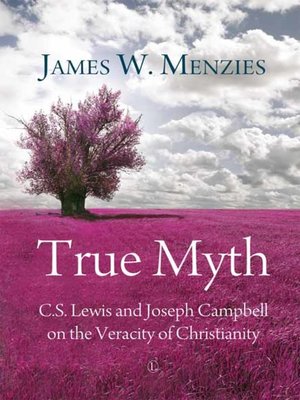True Myth
ebook ∣ C.S. Lewis and Joseph Campbell on the Veracity of Christianity
By James W. Menzies

Sign up to save your library
With an OverDrive account, you can save your favorite libraries for at-a-glance information about availability. Find out more about OverDrive accounts.
Find this title in Libby, the library reading app by OverDrive.



Search for a digital library with this title
Title found at these libraries:
| Library Name | Distance |
|---|---|
| Loading... |
True Myth examines the meaning and significance of myth as understood by C.S.
Lewis and Joseph Campbell and its place in the Christian faith in a technological
society. C.S. Lewis defined Christianity, and being truly human, as a relationship
between the personal Creator and his creation mediated through faith in his son, Jesus.
The influential writer and mythologist Joseph Campbell had a different perspective,
understanding Christianity as composed of mythical themes similar to those in other
religious and secular myths. While accepting certain portions of the biblical record as
historical, Campbell taught the theological and miraculous aspects as symbolic – as
stories in which the reader discovers what it means to be human today. In contrast,
Lewis presented the theological and the miraculous in a literal way. Although Lewis
understood how one could see symbolism and lessons for life in miraculous events, he
believed they were more than symbolic and indeed took place in human history.
In True Myth, James W. Menzies skilfully balances the two writers’ differing approaches
to guide the reader through a complex interaction of myth with philosophy, media,
ethics, history, literature, art, music and religion in a contemporary world.
Lewis and Joseph Campbell and its place in the Christian faith in a technological
society. C.S. Lewis defined Christianity, and being truly human, as a relationship
between the personal Creator and his creation mediated through faith in his son, Jesus.
The influential writer and mythologist Joseph Campbell had a different perspective,
understanding Christianity as composed of mythical themes similar to those in other
religious and secular myths. While accepting certain portions of the biblical record as
historical, Campbell taught the theological and miraculous aspects as symbolic – as
stories in which the reader discovers what it means to be human today. In contrast,
Lewis presented the theological and the miraculous in a literal way. Although Lewis
understood how one could see symbolism and lessons for life in miraculous events, he
believed they were more than symbolic and indeed took place in human history.
In True Myth, James W. Menzies skilfully balances the two writers’ differing approaches
to guide the reader through a complex interaction of myth with philosophy, media,
ethics, history, literature, art, music and religion in a contemporary world.







